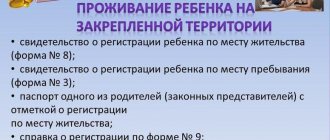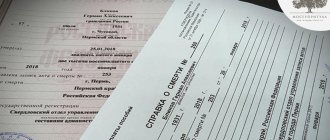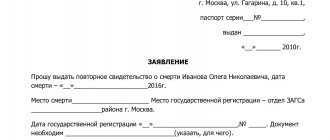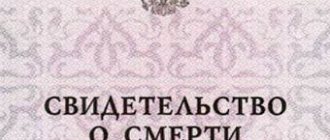The registry office acts as such a body, where the main identification document of a person - a passport - is replaced with a death certificate. This is done immediately on the day of application; according to the law, 3 days are allotted for this from the moment of death of the person. This is rather a recommendation period, since no liability is provided for its violation. There are cases when the document was received much later; there are no obstacles to this. The most important thing is that the document is received before the funeral ceremony, since this is a mandatory condition in order to be able to bury a person in a Moscow cemetery.
The stamp death certificate must contain information such as: passport details of the deceased, date and place of death and registration of this fact, number and date of drawing up the act, date of issue of the death document itself.
While a passport proves the identity of a living person, a death certificate is the main document proving the identity of the deceased. The fact of death means loss of capacity and legal capacity. A death certificate is required so that relatives or authorized persons can proceed with further ceremonies.
What is this?
The death certificate is a standard form, Form No. 33. Contains the following columns that are required to be filled out by an official:
- Last name, first name and patronymic of the deceased.
- Date of Birth.
- Date of death.
- Information about the act in which the death of a person was recorded.
- A detailed explanation of the reasons why the citizen died.
- A place of death.
- Information about the government agency (registry office) where the citizen’s death was registered.
- Date of issue of the document.
- Official seal of the organization.
- Signature of the head of the regional civil registry office.
The photo of the document shows what a death certificate looks like.
Why is it needed?
The issuance of this document is an important task, since it is the decisive document in resolving many legal issues. And especially when it comes to:
- resolving controversial property and inheritance issues;
- registration of a burial place on the territory of the cemetery;
- receiving benefits from the state for burial.
Who is issuing it? You can get it from the registry office, but in recent years applicants can also get it from the MFC by submitting an application online.
Where can I get the document?
Who issues death certificates? This document is prepared at the Civil Registry Office offices. Please note that it is provided along with the death certificate on the same day. The preparation of these documents is completely free for relatives and loved ones of the deceased.
Federal legislation defines a clear deadline within which civil registry office employees must provide the applicant with a certificate of death of his loved one or relative. This is 6 months. In most cases, both the certificate and the citizen’s death certificate are provided to the applicant directly on the day of application.
If the death certificate is lost, damaged, or stolen, then for the issuance of a duplicate, you should contact the same registry office where the first copy of the document was received. Both the original and the duplicate are endowed with equal legal force in this case.
What documents are needed to obtain a death certificate?
Regardless of the cause of death of a person, the following documents must be provided to obtain a certificate:
- a statement written in your own hand according to the sample;
- the applicant’s passport (if a person is a citizen of two countries, you need to take passports of both countries);
- general passport of the deceased;
- documents proving the relationship of the deceased and the applicant (birth certificate, marriage contract, certificate of family composition, etc.);
- medical certificate describing the cause of death;
- a court decision establishing the fact of death (relevant for cases where a person is declared missing and there is no information about his whereabouts for 5 years);
- power of attorney (if the document is received by an unauthorized person).
All documents must be prepared in originals, but you can also make copies in advance to optimize and speed up the process of obtaining a certificate. No other documents are usually required to obtain a certificate. The specified papers are all that is needed to obtain a death certificate.
Which registry office should I contact?
A very pressing question is - which office of the registry office should you contact to obtain a certificate of death of a relative? Russian legislation allows several options:
- At the place of death of the citizen.
- According to the location of the medical institution where his death was recorded.
- At the place of last residence of the deceased.
A duplicate of the document can also be obtained at any of these offices. There is only one limitation - only in where you previously filled out the original.
If a person died in another country, while being a citizen of the Russian Federation, then a death certificate is received in another state - at the place of his death. The rules, conditions for issuing such paper, and the documents required for this may differ significantly from the requirements established by Russian legislation. However, in all cases, the relatives of the deceased must report the incident to the Russian Consulate.
Other documentation confirming the death of a person
In addition to the certificate of form No. 33, the relatives and friends of the deceased must complete other important documents confirming the fact of his death:
- Medical certificate of death. The document is issued by the medical institution where the person died, or by the morgue. This is the paper to which it is legally permissible to make changes. Based on this medical report, the registry office issues a certificate and a death certificate for the citizen.
- Death certificate. In the Russian Federation, this is the main document confirming the death of a person. It is unacceptable to make any changes or amendments to it. The certificate is issued on special stamped paper with a high degree of security.
- Death certificate form No. 34. This is already an archival document. Unlike form No. 33, there is no column “Cause of death”. Changes and additional information can only be entered in a special field on the form.
All of the above documents, except for the medical report, are drawn up at the Civil Registry Office. Let us note once again that receiving them is free, with the exception of the last document. The state fee for issuing a certificate of form No. 34 is 100 rubles.
Should medical confidentiality be maintained even after the death of a person?
The Health Protection Law (Part 2, Article 13) does not allow the disclosure of information constituting medical confidentiality after the death of a person. The previously existing Fundamentals of this rule did not specifically provide for this rule, which made it possible in practice to approach this issue differently.
To maintain the medical confidentiality of the deceased, doctors had to be guided by ethical standards and refer to international experience. Thus, in the Geneva Declaration
(The International Physician's Oath), adopted by the 2nd General Assembly of the World Medical Association in September 1948 (as amended in 1983), states that the doctor undertakes to respect the secrets entrusted to him even after the death of his patient.
According to the International Code of Medical Ethics,
adopted by the 3rd General Assembly of the World Medical Association in October 1949 (as amended in 1983), “the death of a patient does not relieve a doctor from the obligation to maintain medical confidentiality.”
The same rule is recorded in the Fundamentals of the concept of patients' rights in Europe,
adopted by the World Health Organization (WHO) in 1994. It is also present in
the Code of Ethics of the Russian Physician
of 1994, according to Article 13 of which “the death of a patient does not relieve one from the obligation to maintain medical confidentiality,” as well as in the Russian
Code of Professional Ethics of Psychiatrists
of 1994 .
However, there are exceptions to this rule. They relate, in particular, to the rules for issuing a medical report on the cause of death and diagnosis of the disease of a deceased citizen. In accordance with Part 5-7 of Article 67 of the Law on Health Protection, such a conclusion is issued to a spouse, a close relative (children, parents, adopted children, adoptive parents, siblings, grandchildren, grandparents). In the absence of these persons, the conclusion is issued to other relatives or the legal representative of the deceased, law enforcement agencies, the body exercising state control over the quality and safety of medical activities, and the body exercising control over the quality and conditions of medical care, upon their request. The law gives the spouse, relatives or legal representative of the deceased the right to appeal the conclusion of the pathological-anatomical autopsy in court.
Based on this norm, a spouse or close relative has the right to receive only a conclusion about the cause of death and diagnosis of the disease of the deceased and does not have the right to ask a medical organization to provide other medical documents and their copies.
Thus, by the decision of the Kavkazsky District Court of the Krasnodar Territory dated June 15, 2012 (case No. 2-594/12), the claim of Drozdov N.A. to the administration of the Central Regional Hospital was partially satisfied. The court imposed an obligation on the head doctor of the hospital to extradite Drozdova as the wife of the deceased T.S. Drozdova. in accordance with the Recommendations for the procedure for issuing and filling out registration form No. 106/u-08 “Medical Death Certificate”, approved by order of the Ministry of Health and Social Development of Russia dated December 26, 2008 No. 782n (letter of the Ministry of Health and Social Development of Russia dated January 19, 2009 No. 14-6 /10/2-178) medical certificate of death of Drozdova, who died on April 14, 2011, a copy of the protocol establishing the death of Drozdova. In terms of providing the opportunity to familiarize himself with the medical documents of the deceased wife (the original medical records of Drozdova from the village hospital, an outpatient card from the archive) and receive copies of them, Drozdov was denied by the court.
Close relatives of a deceased patient do not have the right to demand that they be given a copy of the medical history of the deceased for the purpose of checking the quality of medical care provided to him.
Thus, the Oktyabrsky District Court of Barnaul, by its decision of September 4, 2013 (case No. 2-2900/13), rejected the application of V.P. Panchenko. and Parshina T.V. on declaring illegal the action of the chief physician of the city hospital in refusing to issue them a copy of the medical history of the deceased L.N. Panchenko, who died in the trauma department, where she was hospitalized as planned.
Husband and daughter Panchenko L.N. sent a written request to the chief physician of the hospital to issue a certified copy of the medical history of the deceased in order to assess the quality of medical care provided to her and identify signs of the presence (absence) of a civil offense. The hospital's chief doctor refused to give the deceased's husband and daughter a copy of her medical history, citing medical confidentiality. The applicants believed that the ban on disclosing medical confidentiality in relation to the deceased was “lifted”, since close relatives or another person who assumed the responsibility for burying the deceased was given a document containing information about the state of health of the deceased. The applicants pointed out that the failure to provide information about the circumstances of the death of L.N. Panchenko. to her relatives (husband and daughter) contradicts their right to receive information in accordance with Article 8 of the Federal Law “On Information, Information Technologies and Information Protection.” The defendant, in their opinion, has actually already violated the fundamental Law on Health Protection, which he himself indicated, by providing them with a certificate and a death certificate, which contain information constituting a medical secret, namely the diagnosis (Unspecified septicemia, directly leading to death; unspecified hypostatic pneumonia, which led to the above cause and unspecified arthritis, as well as insulin-dependent diabetes mellitus with other specified complications that contributed to death, but were not associated with the disease). Article 13 of the Health Protection Law does not indeed contain such a basis for providing information constituting medical confidentiality; it, according to the applicants, follows from Articles 6 and 8 of the Federal Law “On Burial and Funeral Affairs.”
The court did not agree with the applicants and concluded that the refusal of the hospital's chief physician complied with the requirements of the law. Part 2 of Article 13 of the Law on Health Protection establishes a ban on the disclosure of information constituting medical confidentiality even after the death of a citizen, with the exception of cases (parts 3 and 4 of Article 13) of providing such information to maintain a balance of private and public interests.
An exception to the general rule on maintaining medical confidentiality after the death of a citizen (Part 5 of Article 67 of the Health Protection Law), by virtue of which close relatives are provided with a medical report on the cause of his death and the diagnosis of the disease, in the opinion of the court, does not indicate a violation by the medical institution medical confidentiality (as the applicants pointed out in court), but that the legislator placed the interests of the relatives of the deceased in obtaining information above the interests of the individual, whose right to confidentiality was preserved during his lifetime. The law, which ensured the protection of a citizen’s right to medical confidentiality during his lifetime, obliges medical workers to transfer part of the confidential information about the health and life of the deceased to members of his family to the extent determined by Part 5 of Article 67 of the Health Protection Law. The ban on providing information after the death of a citizen, with the above exceptions, applies not only to strangers, but to all persons without exception, including close relatives. After all, it is impossible to exclude a situation where a citizen under no circumstances wants information about the state of his health, other information reflected in his medical history, to become the property of even those close to him.
The court rejected the applicants’ arguments that, without studying the medical history, they would not be able to resolve the issue of the presence or absence of grounds for filing a claim in court for compensation for moral damage, since if an unfounded claim is brought, they will be forced to bear legal costs for paying state fees, carrying out forensic medical examination, representative services. The court indicated that a citizen can choose a method of protecting a violated right, how to actually decide whether he considers his right to be violated or not, on the basis of information available or received in the prescribed manner, taking into account specific life circumstances of which he is aware. The court, if a citizen files a corresponding claim, is obliged to assist him in obtaining information and documents that cannot be provided to the citizen personally by virtue of the law. In addition, a citizen is not deprived of the right to contact the authorities that carry out state control of the quality of medical care without charging any fees.
In this case, the court's opinion that the interests of the relatives of the deceased patient in obtaining information in this case was placed by the legislator above the interests of the individual, whose right to privacy was preserved during his lifetime, seems somewhat controversial. Strange as it may seem at first glance, issuing to relatives a medical report on the causes of the patient’s death and his diagnosis serves the interests of not only the relatives, but also the deceased himself in relation to the issue, in particular, the validity of the diagnosis officially given to him, from the point of view, for example, assessments of the decisions he made shortly before his death. The rule on issuing a medical report on the diagnosis and causes of death also serves, in our opinion, the general goals of providing quality medical care.
As evidenced by judicial practice, a close relative of a deceased patient does not have the right to receive a copy of his medical history, even if the relative has a power of attorney, drawn up by the patient during his lifetime, for the right to receive his medical documentation when providing him with medical care.
Thus, the Judicial Collegium for Civil Cases of the Murmansk Regional Court (appeal ruling dated October 23, 2013 No. 33-3584/2013) upheld the decision of the Kola District Court dated October 8, 2012, which rejected the claim of Gulko E.I. to the State Budgetary Healthcare Institution “Kola Central District Hospital” to impose the obligation to issue copies of medical documents.
Gulko explained that his mother, KHL, while undergoing symptomatic treatment at the Kola Central District Hospital, notarized a power of attorney for him to represent her interests in all institutions, including the right to receive various types of documents. In addition, in her medical history, the doctor on duty made a note about the will of the HLP to transfer information about the state of her health to her son. During the mother's stay in the hospital, her attending physician provided him with information about her state of health and the prognosis of the development of the disease. On behalf of his mother, he signed consent for medical intervention and received a post-mortem discharge summary.
After her death, he twice contacted the defendant with an application for a copy of the CLP medical history, which he needed to study the results of the examination, assess the completeness and correctness of the treatment, but he was refused citing medical confidentiality. Gulko pointed out that Part 3 of Article 13 of the Law on Health Protection does not establish the termination of a citizen’s written consent to the disclosure of information constituting medical confidentiality from the moment of his death, as well as the mandatory form for drawing up such consent. The general power of attorney submitted by him to the case file, issued by KhLP, was not disputed and was not recognized as invalid. It contains the mother’s will to provide all documents due to her to her son, including those containing medical secrets. Gulko also disputed that the court of first instance refused to satisfy his request to request and include in the case materials a copy of his mother’s medical history, which deprived him of the opportunity to familiarize himself with it and indicate to the court the presence of circumstances relevant to the case.
The panel of judges found the decision of the trial court to reject Gulko’s claim legal and justified. In her opinion, the law does not provide for the provision of information constituting medical confidentiality to a relative of a deceased patient in the absence of the latter’s consent. The list of cases of providing such information without the patient’s consent is exhaustive and does not provide for the possibility of providing it to a relative of a deceased patient, regardless of the degree of relationship, including for the purposes stated by the plaintiff. The fact that during the life of KhLP a power of attorney was issued in the name of Gulko for the right to represent her interests in all institutions with the right to receive documents does not indicate the consent of KhLP to provide (disclose) information about her state of health, diagnosis, results of examination and treatment after her death . In itself, Gulko’s provision of information constituting medical confidentiality regarding his mother during the period of her treatment does not constitute grounds for providing such information after her death in the absence of evidence confirming his right to receive it. In addition, on the basis of subparagraph 6, paragraph 1, Article 188 of the Civil Code of the Russian Federation, the power of attorney is terminated due to the death of the citizen who issued it.
This conclusion of the court seems, although formally correct, however, not entirely fair. It is difficult to imagine that a mother, when drawing up a power of attorney in the name of her son for the right to receive documents, including medical ones, would also calculate the situation in the event of her death in a medical institution, specifically stipulating in the power of attorney her consent to provide her son with a copy of the medical history, if he will have doubts about the validity of her treatment. However, the fact remains: in a number of cases, when drawing up powers of attorney, recording the patient’s will in medical documents, it is advisable to take into account various options for the possible development of events. Since medical institutions for the most part are not interested in specially registering such a will of the patient and, accordingly, in issuing to his proxies the medical documentation of the deceased in full, the “burden” of initiative in this matter lies with the patient himself and his relatives.
Certificate or certificate?
Many people confuse these documents with each other. But a death certificate and a certificate of form No. 33 are different documents. They are united only by the fact that they are registered in the registry office.
Let's look at the difference:
- Death certificate. This document in Russia confirms that a particular citizen is dead. This is an important document on a special form, characterized by a high degree of protection against forgery and falsification. Such a certificate allows relatives and friends of the deceased to apply to the courts with various claims on inheritance, property and other issues.
- Certificate of death. It is not necessary to receive this document. It is only necessary if the family of the deceased wishes to receive monetary compensation from the state for burial. The paper is issued in the same way as a death certificate at the registry office. The basis for its issuance is the same medical report issued at a medical institution or morgue.
Classifier of causes of death indicated in medical certificates
The letter from the Ministry of Health and Social Development strictly regulates the order of entries when filling out papers for births and deaths. According to it, the final clinical diagnosis must contain one primary cause of death of the subject. This reason and the complications accompanying it are reflected in subparagraphs “a-d” of the document. But the state described by the top line must act as a consequence of the states described by the bottom lines.
Therefore, the certificate first indicates the “immediate cause” of death, usually caused by complications of other diseases, which are more specifically stated further: in the “intermediate cause”, “primary cause”, and also in the “external cause” (in case of injury or poisoning).
Features of obtaining a duplicate
We have already noted that obtaining a duplicate of certificate form No. 33 is possible. This is directly regulated by Art. 9 Federal Law No. 143. The loss of such a document does not indicate that its legal force is lost. By the way, re-issuance of all certificates that in one way or another reflect the civil status of an individual is possible in the Russian Federation.
An application for a duplicate can be submitted either in person or using postal services. If you contact the Civil Registry Office directly, a second copy of the certificate can be obtained immediately on the day of the visit.
Today it is possible to fill out an application for the issuance of a duplicate certificate of death of a relative remotely - using the State Services Internet portal.
A relative of the deceased or another interested person can receive a repeated certificate. It will be necessary to demonstrate documents, one way or another, reflecting involvement in the funeral or family connection with the deceased.
How to restore a certificate
If the certificate has been lost or torn, it can be restored. You can obtain a duplicate death certificate through the registry office. To do this, you must present the following documents:
- a statement indicating the reasons for the loss or damage of the main document in the prescribed form;
- the applicant's current general passport;
- a document confirming the fact of relationship with the deceased;
- receipt for payment of state duty.
The issued duplicate has the same legal force as previously issued death documents.
Providing compensation for funerals
We have discussed how to obtain a death certificate. As already mentioned, it is this document that gives the right to provide funeral compensation. This point is regulated by Art. 9 Federal Law No. 8 “On burial and funeral business” (1996). In particular, here are the services for which the state provides compensation:
- Preparation of documentation necessary for the burial of the deceased.
- Transporting the body of the deceased to a crematorium or cemetery.
- Actually, cremation or burial.
An important nuance here: the amount spent on the above should not exceed the amount of social benefits. This is the second option for state assistance during the burial of a citizen.
The amount that is paid to the relatives of the deceased who are involved in his funeral is not static. It depends on the level of market prices and inflation. Therefore it changes every year. For 2018, this is just over 5.5 thousand rubles. This point is directly regulated by Art. 10 Federal Law No. 8 “On burial and funeral business.”
If an employee dies at work
In the event of the death of an employee, doctors, police and the State Labor Inspectorate (GIT) are called, and the relatives of the deceased are also notified. After establishing the fact of death and drawing up a report, the body of the deceased is delivered to the morgue for a forensic medical examination.
Next, the State Tax Inspectorate organizes a commission investigation into death in the workplace, which ultimately determines the cause of death - natural (illness) or as a result of an accident. The commission, headed by a labor inspector, includes representatives from the employer, trade union, and social insurance fund (FSS). Relatives of the deceased have the right to participate in the work of the commission.
Subsequently, the State Labor Inspectorate, as a rule, conducts additional inspections of compliance at the enterprise with labor legislation, violations of which could become indirect causes of the employee’s death.
Registration of benefits
Where can I get a death certificate for a citizen? At the registry office. For state assistance in the form of compensation for funerals, you must apply to other authorities:
- Branch of the Pension Fund (respectively, if the deceased was a pensioner).
- Organization, enterprise-employer of the deceased (if he was listed as an employee at the time of death).
- Local military registration and enlistment office (if the deceased was a military serviceman - both active and retired). It is worth noting that the provision of financial assistance during the burial of military personnel is somewhat different. It is regulated by Art. 11 Federal Law “On burial and funeral business”. The amount of compensation here will differ from the standard one.
- Social security authorities (in other cases).
The list of documents required to provide compensation varies depending on which authority you apply to. However, everywhere you will need the following:
- A document proving your identity.
- Certificate from the registry office about the death of a citizen.
- Death certificate in his name.
Regional benefits
In addition to federal compensation, relatives and friends of the deceased can receive material support from the regional budget. This will take into account the status of the deceased, as well as the financial situation of the family that suffered the loss. Among the necessary documents for receiving regional benefits is also a death certificate issued by the registry office.
As a rule, compensation payments in the regions of the Russian Federation exceed federal assistance in volume. For comparison, here are some compensation amounts:
- Moscow. The amount of compensation is from 11 thousand rubles.
- Saint Petersburg. A one-time payment to the relatives of the deceased in the amount of 9 thousand rubles.
- Moscow region. The family of the deceased is entitled to regional monetary compensation, the amount of which starts from 4 thousand rubles.
Death certificate form No. 33 is a document that is issued in the registry office. It can be received either by a relative of the deceased or by another interested person who organized the funeral of the deceased. This certificate gives the right to receive federal and regional financial benefits for burial.










